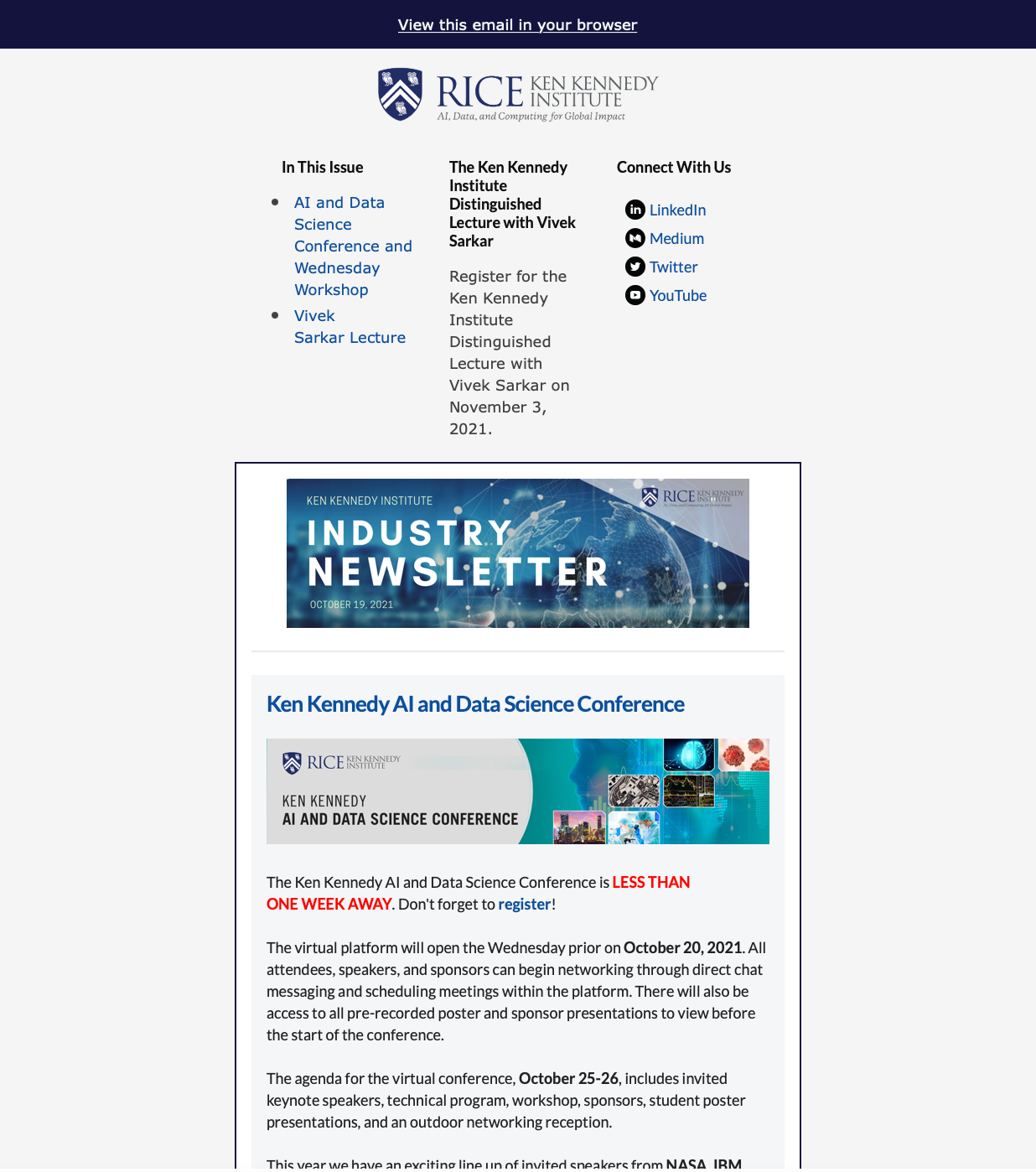|
|
|
|
- AI and Data Science Conference and Wednesday Workshop
- Vivek Sarkar Lecture
|
|
|
|
The Ken Kennedy Institute Distinguished Lecture with Vivek Sarkar
|
|
| Register for the Ken Kennedy Institute Distinguished Lecture with Vivek Sarkar on November 3, 2021. |
|
|
|
|
|
|
Ken Kennedy AI and Data Science Conference

The Ken Kennedy AI and Data Science Conference is LESS THAN ONE WEEK AWAY. Don't forget to register!
The virtual platform will open the Wednesday prior on October 20, 2021. All attendees, speakers, and sponsors can begin networking through direct chat messaging and scheduling meetings within the platform. There will also be access to all pre-recorded poster and sponsor presentations to view before the start of the conference.
The agenda for the virtual conference, October 25-26, includes invited keynote speakers, technical program, workshop, sponsors, student poster presentations, and an outdoor networking reception.
This year we have an exciting line up of invited speakers from NASA, IBM, AWS, Human Rights Data Analysis Group, Lawrence Livermore National Laboratory, and Rice University.
Conference registration is free, thanks to our sponsors! Click HERE to register for the conference.

Scalable and Sustainable AI Workshop: Overcoming the Wide Gap Between AI in Theory and AI in Production
Wednesday, October 27 will be an in-person add-on day with a technical workshop highlighting deep learning and high-performance computing with Alex Smola, VP of AWS, and Anshumali Shrivastava with Rice University.
Workshop registration comes with a small fee. See prices here.
Click HERE to register for our Wednesday Workshop.
|
|
|
Ken Kennedy Institute Distinguished Lecture
McMurty Auditorium | November 3, 2021 | 4:00PM - 6:00PM |
|
Ken Kennedy Institute Distinguished Lecture Series brings leaders in the field of computing and data science from both academia and industry to Rice to speak about the impact of their work.
Title: Back to the Future: Revisiting Data Flow through a Software Lens
Abstract: Multiple simultaneous disruptions are currently under way in both hardware and software for future parallel and high-performance computing systems. These disruptions include new kinds of heterogeneous processors and accelerators, heterogeneous memories, near/in-memory computation structures, and even non von Neumann computing elements. In addition to the fundamental challenges of building programming models, compilers, runtime systems, and debugging/verification tools for these "extreme heterogeneity" platforms, the software challenges are further compounded by the rise of large-scale data science and AI applications. These applications are being driven by domain experts who expect the programmability that they are accustomed to from high-level environments like Python and Jupyter notebooks.
While current software foundations have served us well for many decades, we now see signs of their limitations in the face of these disruptions. This talk makes the case that a fundamental reimagination of the software stack will be critical to ensuring the productivity and programmability of future HPC systems. Our claim is that data flow execution models offer a promising foundation for such a reimagined software stack. To support this claim, we summarize experiences from the Habanero Extreme Scale Software Research Laboratory at Rice University and Georgia Tech, where we have shown how a wide range of primitives for parallelism, concurrency, and locality/distribution can be supported by a unifiied event-driven execution model akin to ideas from the earliest data flow systems. These experiences span a broad spectrum, including: theoretical results related to data races, deadlock, and determinism; new programming model, compiler, and runtime capabilites; and, performance results on a wide range of heterogeneous and distributed platforms.
Speaker: Vivek Sarkar is Chair of the School of Computer Science and the Stephen Fleming Chair for Telecommunications in the College of Computing at Georgia Institute of Technology. He conducts research in multiple aspects of programmability and productivity in parallel computing, including programming languages, compilers, and runtime systems for parallel, heterogeneous, and high-performance computer systems.
Sarkar began his career in IBM Research after obtaining his Ph.D. from Stanford University, supervised by John Hennessy. His research projects at IBM include the PTRAN automatic parallelization system led by Fran Allen, the ASTI optimizer for IBM’s XL Fortran product compilers, the open-source Jikes Research Virtual Machine for the Java language, and the X10 programming language developed in the DARPA HPCS program. He was a member of the IBM Academy of Technology during 1995-2007. After moving to academia, Sarkar has mentored over 30 Ph.D. students and postdoctoral researchers in the Habanero Extreme Scale Software Research Laboratory, first at Rice University during 2007-2017, and now at Georgia Tech since 2017. Researchers in his lab have developed the Habanero-C/C++ and Habanero-Java programming systems for parallel, heterogeneous, and distributed platforms. While at Rice, Sarkar was the E.D. Butcher Chair in Engineering, served as Chair of the Department of Computer Science, created a sophomore-level course on the fundamentals of parallel programming (COMP 322), and a three-course Coursera specialization on parallel, concurrent, and distributed programming.
Sarkar is an ACM Fellow and an IEEE Fellow. He has been serving as a member of the US Department of Energy’s Advanced Scientific Computing Advisory Committee (ASCAC) since 2009, and on CRA’s Board of Directors since 2015. He is also the recipient of the 2020 ACM-IEEE CS Ken Kennedy Award.
Free. Registration required. |
|
|
|
|
|
|
|
|
